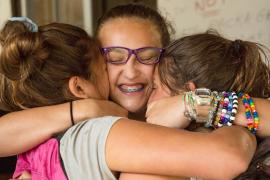All camps are proud of their program offerings and the skills they teach children. They are equally proud of the traditions that may in time grow to be part of campers' lives. However, as wonderful as the programmatic aspects of a camp may be, what we teach campers may not be the most important part of their summer experience. The most crucial and unexpected moments of a summer may be when children are left alone to engage in free, undirected play. For many campers, the experience of playing outside "alone" or with a group of friends may be a truly new and joyful one. The loss of time for free, undirected play in everyday life is one of the saddest facts of modern childhood.
As a school consultant, I have watched the growing phenomenon of the over-scheduled child, particularly in affluent suburbs, and in independent and international schools. As a camp consultant, I have observed how many campers' parents monitor them extremely closely; one might say microscopically. Indeed, Ron Taffel, a psychologist in New York, reports that much of modern parenting involves meticulous time management of a child's packed schedule. This is a source of sadness for me and for many people who work with children.
I was talking with a teacher at an international school once when her voice took on a tone of regret, even guilt. "This is a wonderful school," she said, "And I love teaching here, but sometimes I feel bad for the children who go here." It turned out that what made her feel this way was the lack of play time in the lives of her students and the weight of the academic demands that the school — that she — placed on them. The teacher is not alone. Every thoughtful educator and every parent has worried that there is something missing in the lives of today's children.
When we think about it, we conclude that what is missing is play, or a work/play balance, or, as I believe, the loss of a certain kind of play that should exist in childhood: free, undirected play. We are doing great things for children in many ways, but we are not leaving them alone enough. I know that I hardly ever see children playing by themselves in my neighborhood, a trafficfree cul-de-sac in a very safe suburb six miles outside Boston. They are not there in winter — no snowmen — and almost never in the summer. Many young families have moved into the neighborhood in the past few years. Their children, ranging in age from fifteen months to thirteen years old, came to our door for candy on Halloween. I had never seen them playing in their yards, but I certainly did notice that all of them were accompanied by their parents, many of whom came right up on the porch behind their children and, when we offered them two or three candies, instructed them, "Just take one."
Researchers tell us that over the past two decades, children in the United States have lost nine to twelve hours of free play per week. Over the past decade, forty percent of elementary schools in the U.S. have eliminated recess, leaving children with less than a twenty-minute break (for lunch) in a six-hour school day. At school, we have replaced recess time with increased seat time as preparation for state tests; at home, parents have replaced free play time with organized town sports, art, dance, and, of course, tutoring.
When I ask an audience of one hundred mothers and fathers to raise their hands if they had parents who sent them out the door to play in the neighborhood with instructions to "Stay out until dinner or until the street lights come on," eighty-five of them will raise their hands to indicate that they had played out-of-doors, away from home for two to five hours (and even longer) at a stretch. When I ask those same parents: "How many of you now send your children outside to play for more than two hours without contact with you?" only four or five people raise their hands.
Free, undirected play used to be valued as a central, indeed, the defining activity of childhood, for good reason. Jaak Panskeep, play researcher at Washington State University, calls play the "signature mammalian behavior." According to David Elkind it is a child's " . . . inborn disposition for learning, curiosity, imagination, and fantasy." Many people reading this paragraph remember their mothers sending them outside to play with children in the neighborhood from three in the afternoon until dinner time with the unequivocal instruction: "Go play!" In 2007, The American Academy of Pediatrics issued a report declaring that, "It is through play that children at a very early age engage and interact with the world they can master, conquering their fears while practicing adult roles." Play makes children creative and strong; play reassures children that they are okay in the world. Our mothers knew that, but today's parents do not value play in the same way.
What happened to play time? What happened to our respect for play? A lot of free time has simply disappeared because American children spend so much time — 101 minutes per day — in the car. In U.S. suburbs, neighbors no longer know or trust each other; we are afraid of pedophiles and strangers; we are comforted by organized town sports because our children are supervised and away from computer screens. Many parents are afraid that their children will be traumatized by bullying that they imagine might occur in free play. But most parents are simply worried about their children's futures in a competitive, globalized economy. They want their children to be successful in school because they want them to have successful lives and are ready to sacrifice play time for more and more study time.
What is the price our children are paying for the loss of free play? There are six costs that we can see: 1) obesity; 2) high stress levels; 3) rapidly increasing diagnosis of ADHD, depression, and emotional fragility; 4) social incompetence; 5) excessive dependence on adults; and 6) the loss of a relationship with nature. In the industrialized world, the most obvious cost of the loss of outdoor play is our epidemic of child obesity. Even though 90 percent of American children are in organized sports, obesity continues to rise. After the car ride to the field, changing into a uniform, the talk by the coach, etc., two and a half hours of organized sports may provide only thirty minutes of actual exercise, far less than running around the neighborhood. The same thing may be true of summer camps. While there is far more exercise overall during a day at camp, in organized, skill-building activities much of the time is spent listening to an instructor, learning the skills one-by-one. My annual visits to a boys' summer camp suggest to me that children often get more exercise in spontaneous after-dinner games of tag, baseball, or basketball. That's when I see boys soaking wet with sweat — happy and smiling. When I see girls sitting at the table after lunch, by themselves, inventing hand-and-rhythm games, singing together, and challenging each other to ever more complex lyrics and rhymes I see a joy and creative imagination at work that I don't see in adult-organized activities.
Pediatricians are seeing increased levels of stress and anxiety in children, many of whom are overwhelmed by future expectations for college, etc., they don't know if they can fulfill. The increase in diagnosis of mental disorders in children, particularly ADHD, depression, and bi-polar disorder has been stunning; many researchers have suggested that the increase in ADHD is a direct result of reduced play time; some researchers believe that children may be missing a crucial modulator of nerve cell development (BDNF, brain-derived neurotrophic factor) which is generated by vigorous exercise and learning. Anecdotally, teachers report that many children are more emotionally fragile than their students in the past.
Teachers who supervise recess often find that children are unable to organize games or resolve conflicts on their own. They quickly turn to adults for help in resolving minor disputes, even up to fifth and sixth grade. The teachers at one elementary school engage in triage by saying, "Don't ask us to get involved unless the situation is "D & D," dangerous and destructive." Finally, as Richard Louv warns us in The Last Child in the Woods, today's children are losing touch with nature; they have no independent relationship with the out-of-doors.
The loss of free, undirected play is a significant problem in contemporary childhood. Educators, camp counselors, and child care workers of all kinds need to protect the time they give children to play freely; they need to increase that time if possible; and they need to educate parents about the importance of play. However, the barriers to increased playtime in schools are significant; it is not going to be easy to open up the school schedule. While it is easier for camp counselors, I know that there are barriers in camp life, too. Parents want to be sure that children are "supervised;" we have many more concerns about safety and liability than we did in the past and; most perniciously, we may feel that the best thing we do for the children is the activities that we run for them.
What I am trying to argue is that the best thing about summer camp might be playing ping-pong in the lodge out of sight of the counselors. That is a humbling thought for many of us, but it bears repeating: the most important and unexpected thing we can do for our campers is to give them time for free play, time to confront their own "boredom," learn how to entertain themselves with a friend, and organize a game with their peers. Between school, organized town sports, music lessons, art, dance, SAT tutoring and worthy service learning projects, that's what today's campers aren't getting to do enough of at home.
One final story: I am the supervising psychologist for an all-boys school in suburban Boston, the Belmont Hill School, and we have a first-rate hockey rink and competitive ice hockey teams, many of which start to play competitively right after the twoweek Christmas break. Two years ago, one of our boys called the athletic director, Mr. Tahan, and had the following conversation with him.
"Mr. Tahan, is there going to be recreational ice time for Belmont Hill boys over the vacation?"
"Yes, of course, we reserve recreational ice time for our students."
"But, I don't mean just skating in a circle, I mean with sticks and pucks, so we can play."
"Yes, of course you can use sticks and pucks in those hours."
"But, will there be other boys to play with?"
"I don't know for sure, but you can call some boys and organize a game."
After a long pause the boy said, "Well, could you organize the games?' When he heard that, Mr. Tahan realized that this fourteen-year-old boy, who had played on select town hockey teams since the age of six, had never organized his own game of hockey….never in his life. That made him deeply sad, because he had grown up in upstate New York organizing lake hockey games every weekend. The idea that a boy couldn't pull a group together depressed him. It worries me, too.
In the end, you can't teach children to play alone; you have to let them play alone. Many parents are too frightened to do so, and schools cannot find the time to do so. It may be that camp is the place where grown-ups recognize the value of nonscheduled time. I hope so. Our children's imagination, spontaneity, leadership skills, and happiness depend in large part on free, undirected play.
|
Tips for Camp Counselors Recognize the importance of unscheduled time for campers which allows them to organize undirected, free play for themselves. Free play can be in groups, or it can be solitary. Free play always shares the characteristics of being voluntary, absorbing, and imaginative. If your campers ask you to play with them during free periods, do it some of the time, when it is fun for you, but not always. Bow out at a certain point and let them run the game. Don't make your campers depend on you to run all of their games. If they are excessively dependent or lost, challenge them by saying, "You need to organize your own games some of the time. You need to learn how to play on your own . . . so find something to do." From a distance, watch and appreciate the characteristics of free play. When left alone, campers will do many things: create rules, debate rules, resolve conflicts, and exercise leadership. More importantly, they will feel a different energy inside themselves when they play their own games. There is nothing quite like it. Do you remember? |
References
American Academy of Pediatrics. (2007). "The Importance of Play in Promoting Health Child Development and Maintaining Strong Parent- Child Bonds."
Elkind, D. (2006). The Power of Play: Learning What Comes Naturally, Da Capo Press, Philadelphia, Pennsylvania.
Louv, R. (2008). The Last Child in the Woods: Saving Our Children from Nature Deficit Disorder, Algonquin Books of Chapel Hill, Chapel Hill, North Carolina.
Marano, H.E. (2008). A Nation of Wimps: The High Cost of Invasive Parenting, Broadway Books, New York, New York.
Michael Thompson, Ph.D., is a psychologist, camp consultant, and the coauthor of eight books, including Raising Cain and It's a Boy.
Originally published in the 2009 May/June issue of Camping Magazine.



